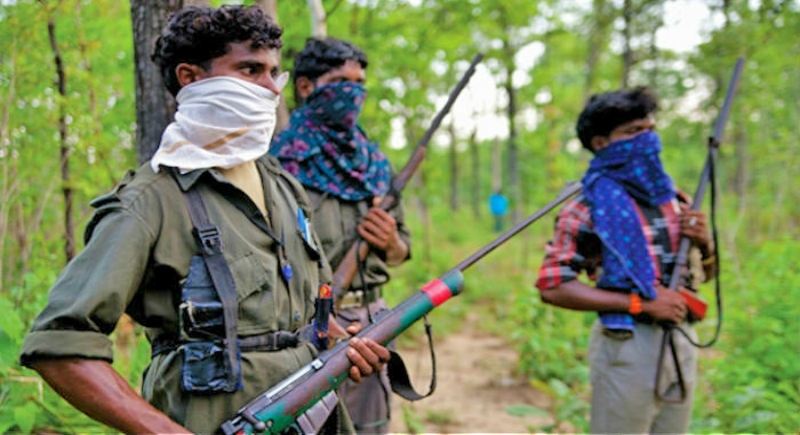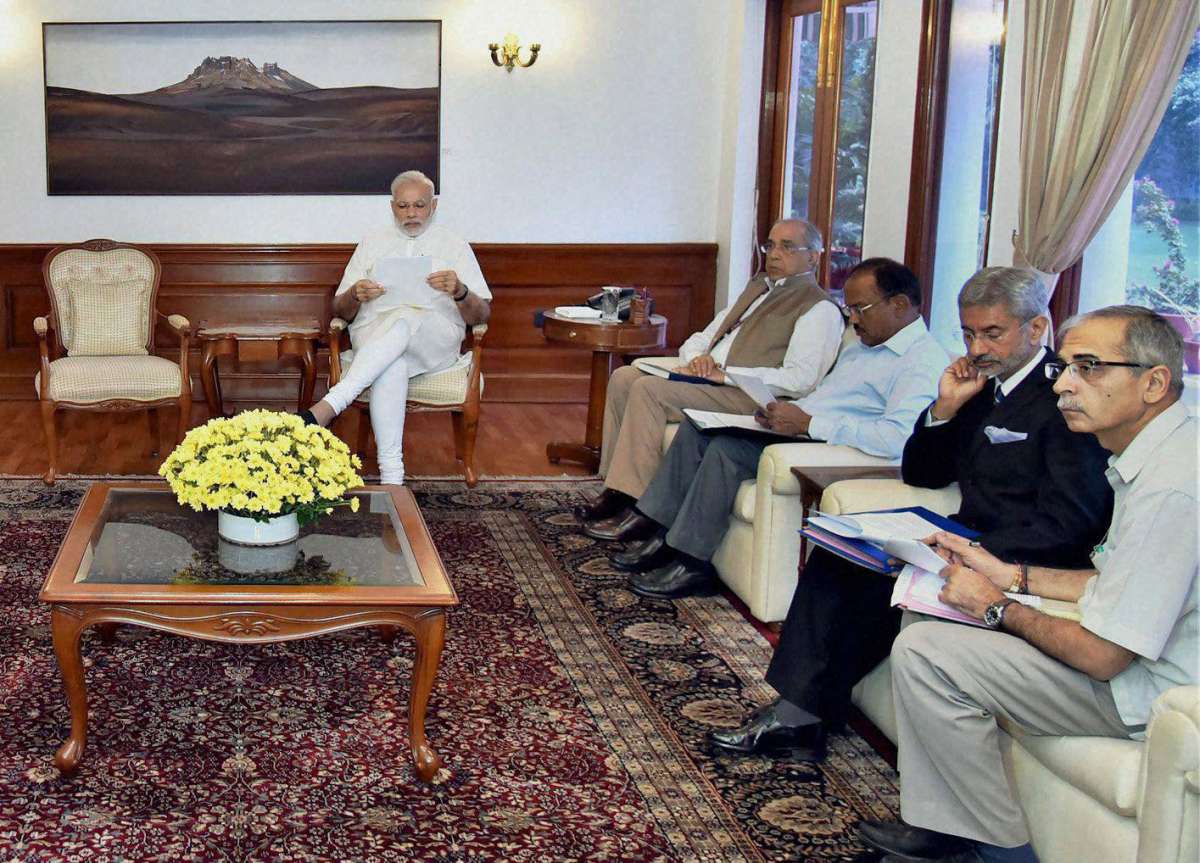


A team of 200 security personnel recently carried out a highly successful operation in the Naxal stronghold of Abujhmad. The operation resulted in the death of 29 Naxals, including two key members. This well-planned and executed operation has significantly weakened the Maoist presence in the region, making it a major success for the Indian security forces. And with the Lok Sabha elections just around the corner, this operation sends a strong message to the Naxals and their supporters.
Naxal Stronghold Cleared: Security Forces Decimate Naxal Cadres in Abujhmad
In a decisive move against the Naxalite scourge, a joint team of security forces recently carried out a highly successful operation in the Naxal-ridden stronghold of Abujhmad, Chhattisgarh. The meticulously planned operation resulted in the elimination of 29 Naxals, including two key members.
Background:
Abujhmad, a vast and remote forest area spread across Chhattisgarh, Maharashtra, and Telangana, has long been a stronghold of Naxalite insurgents. The Naxals, a Maoist rebel group, have been waging an armed struggle against the Indian state for decades.
The operation in Abujhmad was the culmination of months of intelligence gathering and meticulous planning. A team of 200 security personnel, comprising personnel from the Central Reserve Police Force (CRPF), the Special Task Force (STF), and the district police, was tasked with the mission.
Operation Details:
The operation commenced on February 27th, with security forces carefully navigating the dense and treacherous terrain. Using a combination of ground and aerial reconnaissance, they pinpointed the location of a large Naxal camp.
On March 1st, the security forces launched a coordinated assault on the camp. In a fierce firefight, 29 Naxals were killed, including two key members identified as Ravi Seth and Gopal Rao Atram.
Significance:
The success of the Abujhmad operation has dealt a significant blow to the Naxalite movement in the region. The elimination of senior Naxal leaders and cadres has weakened the group's command and control structure.
The operation has also sent a strong message to the Naxals and their supporters that the security forces are determined to crush their insurgency. With the Lok Sabha elections approaching, the operation is seen as a major success for the Indian government.
Top 5 FAQs:
Q1. What is the Naxalite movement? A1. The Naxalite movement is a Maoist-inspired armed rebellion in India, primarily active in rural and forested areas.
Q2. Who are the key members of the Naxal movement who were killed in the Abujhmad operation? A2. Ravi Seth and Gopal Rao Atram.
Q3. What is the significance of the Abujhmad operation? A3. The operation has significantly weakened the Naxalite presence in a key stronghold and sends a strong message to the rebels and their supporters.
Q4. How many security personnel participated in the operation? A4. 200.
Q5. What is the future of the Naxalite movement after the Abujhmad operation? A5. The operation is a major setback for the Naxalites, but the movement is expected to continue in some form, adapting to the changing dynamics.

Indian Union Minister Hardeep Singh Puri responds sharply to Pakistani leader Bilawal Bhutto-Zardari's threatening statement on the Indus Waters Treaty, stating that Pakistan will have to pay a heavy price. Puri also mentions the recent throat-slitting gesture made by a Pakistani Colonel during a protest by Indians at the Pakistan High Commission in London, emphasizing the deteriorating state of Pakistan.

Ranjana Sonawane, the first recipient of India's Aadhar card, still lacks access to government schemes 13 years later. Despite being eligible for the Chief Minister Majhi Ladki Behen Yojana, Ranjana has not received any money due to an issue with her Aadhar being linked to someone else's bank account. This case brings to light the flaws in the implementation of government schemes in rural and tribal areas, where women like Ranjana often have their funds misdirected or lack necessary information.

The Indian National Congress (INC) has announced its plans to launch a month-and-a-half-long campaign in Jammu and Kashmir on April 22. The purpose of the campaign is to demand the restoration of statehood and to further the “Save the Constitution” movement. With the recent appointment of Syed Naseer Hussain as the new J&K in-charge, the party hopes to regain its lost support in the Union Territory. This campaign comes at a crucial time, as former supporters of the Congress leader Ghulam Nabi Azad have recently dissolved their party, raising questions about their political future. The Congress hopes to use this opportunity to highlight the BJP's failures in empowering elected governments and its betrayal over statehood.

Thousands of citizens in Pune are rallying together through an online petition to demand the protection of their city's hills and hill slopes from any construction. The petition is addressed to the former Pune Municipal Commissioner and Chairman of the state-appointed Committee on Bio-Diversity Park and Hill Top Hill Slopes. The citizens are concerned that the committee's review may result in allowing construction on the hills, while strict measures have already been mandated by the government to prevent it. The citizens stress the importance of preserving these natural areas for the city's ecological balance and urge the government to uphold its promise to future generations.

After the devastating terror attack in Pahalgam, Jammu and Kashmir, India has suspended the 1960 Indus Waters Treaty with Pakistan. This decision was made during a key meeting chaired by Union Home Minister Amit Shah, with discussions on potential actions being taken against Pakistan. As tensions between the two countries continue to escalate, Indian leaders have condemned Pakistan for their involvement in the attack and have vowed to take strong measures in response.

The Indian Army made its first major move since the Pahalgam terror attack on April 22, as they killed top Lashkar-e-Taiba (LeT) commander Altaf Lalli in an encounter in Jammu and Kashmir's Bandipora district. The security forces are on the hunt for the terrorists responsible for the brutal killing of 26 civilians and have launched a massive anti-terror operation. In other developments, Indian Army Chief General Upendra Dwivedi visited Srinagar for a security review meeting and the authorities demolished the houses of two suspected terrorists involved in the Pahalgam attack.

In a hearing at the Supreme Court, the bench rebuked Congress leader Rahul Gandhi for his "irresponsible" comments about freedom fighter Vinayak Damodar Savarkar. The judges highlighted the need to show respect for India's freedom fighters and questioned whether Gandhi was aware of his grandmother and Mahatma Gandhi praising Savarkar. The court also stayed an Allahabad High Court order that refused to dismiss a lower court's summons against Gandhi over his alleged remarks about Savarkar.

The Supreme Court has stepped in to warn Congress MP Rahul Gandhi over his comments about India's independence activist Veer Savarkar, staying a trial court's summons to the politician. The top court emphasized that Savarkar is a highly respected figure in Maharashtra and stated that no one would be allowed to make derogatory remarks about freedom fighters. The court also pointed out that Gandhi's family has had a history of praising Savarkar and Gandhi himself has been warned that the court will take suo motu cognizance of any such remarks. Additionally, the article also mentions an attack in Jammu and Kashmir that has led to heightened tensions between India and Pakistan.

In a successful operation by the security forces, a Lashkar-e-Taliba (LeT) terrorist associate, identified as Altaf Lalli, was killed in an ongoing encounter in the Bandipora district of Jammu and Kashmir. The encounter began after the security forces received intelligence about the presence of terrorists in the area. Two security personnel have also been injured in the exchange of fire and are currently undergoing treatment at a nearby hospital. The clash highlights the continued efforts of the security forces to combat terrorism in the region.

The Telangana-Chhattisgarh border is a hotbed of tension as security forces step up their efforts to root out Maoist activity from the region. Top Maoist leader Hidma is the target of current high-security operations, with forces strategically advancing through previously inaccessible areas. With mounting pressure, sources indicate that the hold of the Maoists in the region is gradually weakening, making for a tense and critical situation.